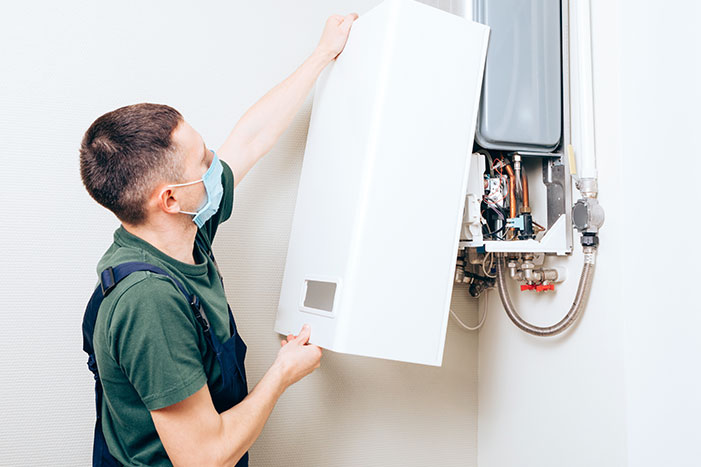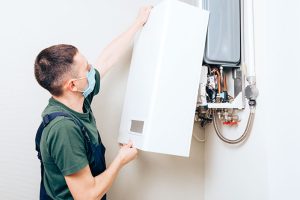One of those pieces of equipment we hardly consider is a water heater until it emits unusual sounds. Your water heater may produce startling cracking, slamming, or rumbling sounds. The heating is not too far off and failing. Is there a basic remedy, or should you hire a plumber now? Knowing the cause of these noises will enable you to act appropriately before a little problem becomes a pricey fix-up job. This blog will dissect the typical sounds a water heater produces, their causes, and how you could address them. Knowing these indicators can help you maintain a smooth functioning heater, whether your unit runs on gas or electricity.
Popping Sounds: A Sign of Sediment Buildup
A popping sound is among the most often heard noises in homes from their water heater. Usually, this results from material accumulating inside the tank. Minerals from the water—especially in challenging water areas—slowly settle in the bottom of the tank with time. Steam bubbles trying to escape the heavy coating of silt when the heating element warms the water produce a popping or cracking sound.
Ignoring this problem might result in reduced efficiency and more expensive energy bills. Using more gas or electricity, a heater trying to heat water through a thick layer of silt needs to work harder. Ignoring sediment accumulation could even lead to the tank overheating and the appliance lifespan being shortened. At least once a year, flushing the tank is the recommended course of action. This procedure involves draining the tank, cleaning the silt, and replenishing it with fresh water. A qualified plumber may assist if you are unclear on how to accomplish this.
Rumbling Noises: Expanding Water and Sediment Issues
A loud rumbling sound sometimes results when the silt within the tank hardens and begins to move about as the water heats up. The water makes a rumbling, thunder-like roar as it spreads past these cemented deposits. Older water heaters or residences with hard water will likely have this issue.
Overheating brought on by too severe sediment accumulation raises the likelihood of the tank cracking or leaking. It’s time to act if you often hear this kind of noise. Flushing the tank could still be beneficial if the accumulation is not too great. On the other hand, replacing the heater might be the wisest course of action if the heater is old or has never been serviced, as damage could already be major. Furthermore, helping to avoid future sediment accumulation is the installation of a water softener.
Hissing Sounds: Possible Leak or High Pressure
Two likely reasons your water heater produces hissing noise are a water leak or too high tank pressure. A tiny leak in the heating element might make a hissing noise as the water immediately converts to steam. Look for evidence of moisture on the pipes and valves or water gathering around the heater base.
An alternative cause of hissing is excessively high tank pressure. The temperature and pressure relief (T&P) valve may hiss if it works, as it should designed to discharge extra pressure. On the other hand, should the valve continuously release pressure, the thermostat may be set too high. Lowering the water temperature to about 120°F, one may avoid too high-pressure development and ease system load.
Banging or Knocking: Water Hammer Effect
Although it might be frightening, a loud banging or pounding noise from your water heater is usually not the heater itself that is malfunctioning. When the water flow abruptly stops or veers off course, a shockwave travels through the pipes and produces this sound, sometimes called a water hammer. This is typical in homes without water hammer arrestors, tiny devices meant to absorb shock and stop pipes from rattling.
Water hammering’s repetitive pressure over time can cause plumbing joints to deteriorate and leak. Installing water hammer arrestors or changing the pressure-reducing valve in your house will lessen the effect. Should the noise continue and originate from the heater, it may point to loose heating components within an electric water heater. Either tightening or replacing the parts will solve this problem.
Sizzling or Crackling: Condensation or Heating Element Issue
Condensation falling on heated components typically produces a sizzling or cracking sound. This is more typical in gas water heaters when the burner touches chilly air or moisture. Although sporadic sizzling is expected as the burner cycles on, continuous noise might point to a problem.
A cracking sound in an electric water heater could indicate mineral deposits covering the heating element. Trapped moisture in the deposits becomes steam when the element warms, producing a cracking sound. Cleaning the heating element might assist if your heater still effectively generates hot water. Changing the element will help the heater run normally should the issue continue.
Whistling or High-Pitched Noises: Pressure and Valve Problems
Usually emanating from a tiny aperture where pressurized water or air is exiting is a high-pitched whistling sound. This can result from a worn-out gasket, a loose or defective valve, or a partial pipe obstruction. If hot water makes whistling noises, investigate the connections surrounding the heater for leaks or loose fittings.
An alternative likely cause is a T&P valve issue. Constant valve venting might result from too high a tank pressure breaking down the valve. High pressure can finally cause a tank to collapse, which might be harmful. Should changing the thermostat not address the problem, have a professional check the heater to ascertain whether a new valve is required.
Conclusion
Though it indicates something needs repair, a loud water heater isn’t necessarily the reason for fear. Whether it’s loose components, too much pressure, or sediment accumulation, knowing the source will help to avoid more major issues down-range. Your water heater’s lifetime may be extended, but it will remain running-free with regular maintenance, correct temperature settings, and sporadic checks. Calling a professional could save you time and effort if you’re unsure how to resolve a problem or believe a significant one exists. Maintaining your water heater guarantees that, when you need it, you get consistent hot water free from the unwelcome soundtrack of popping, rumbling, or hissing noises.



